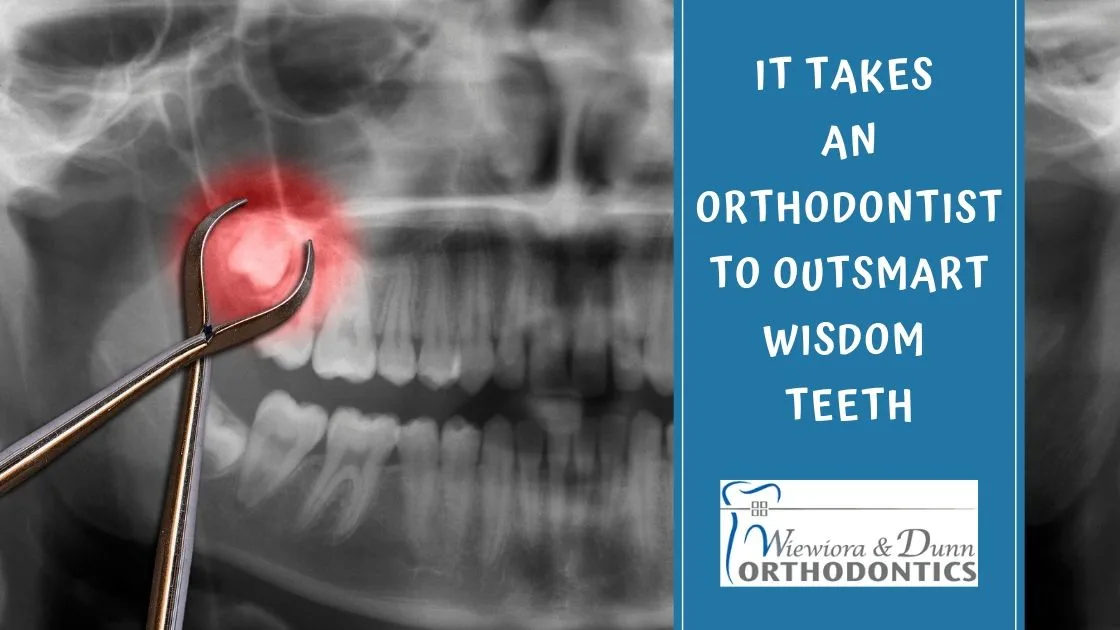Officially known as third molars, wisdom teeth represent an odd time of transition in the human skeleton during our gradual adaptation to our environment and modern way of life. As the jaw bone (mandible) has become smaller – a development generally attributed to changes in diet – wisdom teeth persist in growing. They have yet to get the message that they aren’t necessary, and often cause problems when they assert themselves. For this reason, those not-so-wise wisdom teeth typically need to be extracted.
What Are Wisdom Teeth?
Wisdom teeth are the last set of teeth to erupt (or not – continue reading), which occurs between the ages of 16 to 25 – hence their popular name. There is one third molar on each side of the jaw, both upper and lower, for a total of four. Unlike the first and second molars, however, the modern jaw has little room to accommodate the third. It is more often than not crowded by adjacent teeth.
The Problems With Wisdom Teeth
An impacted wisdom tooth is the most common condition resulting from this lack of real estate. An impacted tooth occurs when the third molar fails to erupt from the gum, or only partly erupts. Issues that can develop include pain, infection, swollen and/or bleeding gums, a swollen jaw, gum disease, tooth decay and difficulty opening your mouth. The growth of cysts in the jawbone can also occur – which could damage the roots of nearby teeth or destroy the bone that supports your teeth.
Whether partially or fully impacted, the wisdom tooth may:
- Grow at an angle toward the next tooth (second molar)
- Grow at an angle toward the back of the mouth
- Grow at a right angle to the other teeth, as if the wisdom tooth is “lying down” within the jawbone
- Grow straight up or down like other teeth but stay trapped within the jawbone
When Should Wisdom Teeth be Removed?
Many people may know they have impacted wisdom teeth, yet chose to do nothing until they experience pain or discomfort. According to an article by Colgate, dentists often prefer to remove wisdom teeth when patients are in their late teens or early 20s, before they cause problems. At this age, the roots have not solidified in the jawbone, and are easier to remove than in older patients. Removing wisdom teeth later in life also carries a slightly higher risk of damage to a major nerve in the jaw, called the inferior alveolar nerve. Younger patients often recover from sedation faster, as well.
For those getting braces, your orthodontist may recommend wisdom tooth extraction before treatment begins, or after completion.
A general dentist can extract wisdom teeth, but if teeth are impacted, an oral surgeon will be necessary. An oral surgeon is a specialist in removing wisdom teeth and is licensed to perform IV sedation, which puts the patient in a semi-awake state. The advantages to IV sedation include an absence of anxiety during the surgery, no sense of the passage of time (as the surgery can be lengthy, especially if more than one are extracted at the same time) and lack of memory of the procedure afterward.
One common question people have as their wisdom teeth come in, is whether they will cause their teeth to crowd. This is a concern, as by the time a person has their wisdom teeth come in, they have likely already undergone orthodontic treatment. However, there is no current research to support the idea that wisdom teeth cause teeth to crowd. In fact, whether or not a person has wisdom teeth, they are likely to experience crowding, as teeth tend to naturally drift forward throughout life. The only way to ensure that your teeth do not crowd post-orthodontic treatment is the long-term use of a retainer.
How to Care for Yourself After Wisdom Tooth Extraction
If you are undergoing IV sedation, you’ll be told to have someone drive you home after surgery. As you may continue to be groggy for some time after, arrange for someone to stay with you if you live alone or, if other family members won’t be home for a while after you return.
Your dentist or oral surgeon will give you a sheet of post-procedure care instructions for the first 24 hours and thereafter. Follow instructions exactly to avoid painful complications, such as dry socket. Expect some bleeding and facial swelling. You may be told to apply ice packs to the swollen areas at intermittent times. Antibiotics will be prescribed to prevent infection. A follow-up visit may be needed to remove stitches and examine for healing progress.
Whether or not you plan to undergo orthodontic treatment, good oral health is important for everyone. At Wiewora and Dunn Orthodontics, patient care and superior customer service are our top priorities.
Dr. Cara L. Wiewiora and Dr. Rick M. Dunn treat patients at our Lake Mary and Longwood offices. Our professional staff will take photos and radiographs for the orthodontist to review, who will then recommend the best treatment option for your specific needs. We invite you to learn what you can expect from your first visit and how we can correct malocclusions. Contact us today to schedule a free consultation.





